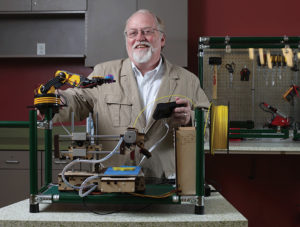University of Mary Washington Professor of Education George Meadows will be recognized for an innovative 3D-printing program that he developed and implemented in regional public schools. The Virginia Mathematics and Science Coalition has selected Meadows’ program, “Makerspaces in Schools,” among the 2017 Programs That Work.

The nonprofit education coalition will honor Meadows at a Feb. 15 reception at the Library of Virginia in Richmond.
The Programs That Work award recognizes exemplary mathematics, science, and integrated science, technology, engineering and mathematics (STEM) programs for which there is evidence of a positive impact on student or teacher learning. Awards are given to those whose work represents innovative programs that demonstrate the important mathematics, science, and STEM concepts, skills or processes that students and teachers learned as a result of the programs.
Meadows, who has taught at UMW for the past two decades, has been at the forefront of teaching students about science and technology in creative ways. With colleagues from the University’s Division of Teaching and Learning Technologies and the Simpson Library, he was among the first to introduce 3D-printing technology into UMW classrooms instructing future teachers. With initial funding from a Shirley Van Epps Waple professional development fellowship in 2013, Meadows introduced the program in area elementary and middle school classrooms.
“It’s always rewarding when one of the school Makerspaces that we helped developed receives an educational award for that program,” said Meadows. “Hartwood Elementary in Stafford County and Mountain View Elementary in Prince William have both received recognition for their Makerspace programs.”
The Makerspaces in Schools program expanded with funding from various grants, awards and alumni donations. The program has helped schools in Stafford, Spotsylvania and Prince William counties, as well as local public libraries and environmental education organizations develop makerspaces.
Knowledge and experience gained from this program also has led to additional funded Makerspace and STEM lab programs in the Richmond City public schools and several Northern Neck of Virginia counties.
Meadows has a bachelor’s degree from Marshall University, a master’s degree from Emory University and a doctorate from West Virginia University. His current research includes the use of computer-related technology in the teaching of elementary science. Meadows is an expert on science education, educational technology and educational research dealing with teacher and/or action research.
Hurrah George, so well deserved. Am so very proud, mgc